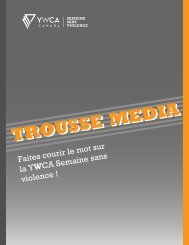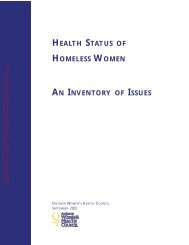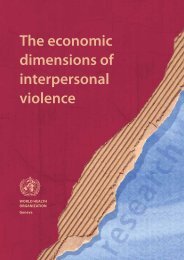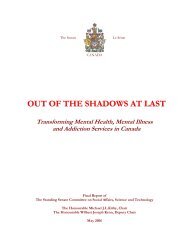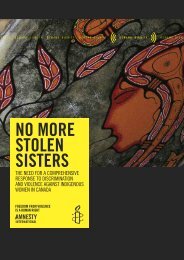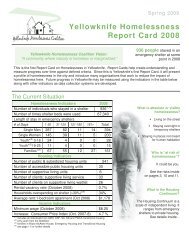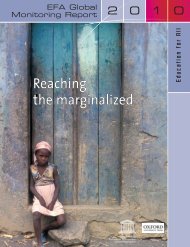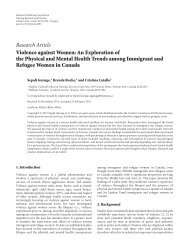Gender Report Card on the International Criminal ... - YWCA Canada
Gender Report Card on the International Criminal ... - YWCA Canada
Gender Report Card on the International Criminal ... - YWCA Canada
Create successful ePaper yourself
Turn your PDF publications into a flip-book with our unique Google optimized e-Paper software.
OTP Situati<strong>on</strong>s and Cases<br />
On 21 February 2011, a special mobile gender<br />
justice court c<strong>on</strong>vened by <strong>the</strong> Government of <strong>the</strong><br />
DRC 587 sentenced Lieutenant-Col<strong>on</strong>el Mutware<br />
Daniel Kibibi of <strong>the</strong> FARDC to 20 years in pris<strong>on</strong><br />
for mass rape as a crime against humanity in<br />
relati<strong>on</strong> to <strong>the</strong> New Year’s Day attack in Fizi,<br />
South Kivu, during which more than 60 women<br />
were raped. During <strong>the</strong> trial held in <strong>the</strong> town of<br />
Baraka, South Kivu, from 10 to 20 February, 49<br />
victims/survivors came forward to testify about<br />
<strong>the</strong> rapes and o<strong>the</strong>r forms of sexual violence<br />
committed during <strong>the</strong> attack.<br />
While this is not <strong>the</strong> first trial in which members<br />
of <strong>the</strong> C<strong>on</strong>golese army have been c<strong>on</strong>victed<br />
for rape and o<strong>the</strong>r forms of sexual violence, 588<br />
Lieutenant-Col<strong>on</strong>el Kibibi is <strong>the</strong> first FARDC<br />
commanding officer and <strong>the</strong> first military figure<br />
within <strong>the</strong> DRC to have been charged with<br />
crimes against humanity for sexual violence<br />
acts. During <strong>the</strong> same trial, ten o<strong>the</strong>r FARDC<br />
soldiers were tried for rape as a crime against<br />
humanity, of whom three were sentenced to 20<br />
years impris<strong>on</strong>ment and five were sentenced to<br />
10 to 15 years. One soldier was acquitted and<br />
<strong>on</strong>e, a minor, was referred to a juvenile court.<br />
587 Funded by <strong>the</strong> Open Society Initiative for Sou<strong>the</strong>rn Africa<br />
(OSISA) and <strong>the</strong> Open Society Justice Initiative (OSJI), and<br />
implemented by <strong>the</strong> American Bar Associati<strong>on</strong> Rule of<br />
Law Initiative, <strong>the</strong> special mobile gender justice court<br />
aims at making justice accessible to victims/survivors<br />
living in remote areas of South Kivu, eastern DRC, and<br />
complement ICC prosecuti<strong>on</strong>s of sexual and genderbased<br />
crimes in <strong>the</strong> province. The special mobile gender<br />
court focuses <strong>on</strong> cases of rape and sexual violence but<br />
can also try o<strong>the</strong>r crimes. According to OSJI, since <strong>the</strong><br />
beginning of <strong>the</strong> project in October 2009, 186 cases have<br />
been heard, of which 115 were rape cases. Of <strong>the</strong>se, 94<br />
resulted in c<strong>on</strong>victi<strong>on</strong>s. See ‘Trial of DRC soldiers accused<br />
of mass rape in Fizi opens tomorrow in special mobile<br />
gender court’, OSISA Media Advisory, 9 February 2011,<br />
available at , last visited <strong>on</strong> 31 October 2011.<br />
588 For example, in October 2010, 13 FARDC soldiers were<br />
sentenced for rape in <strong>the</strong> Walungu area, South Kivu, by<br />
a military court. ‘DRC Mobile Court a Sign of Hope’, IPS,<br />
8 March 2011, available at , last visited <strong>on</strong> 25 October 2011.<br />
According to a Women’s Initiatives’ partner in<br />
South Kivu, <strong>the</strong> state’s attorney had requested <strong>the</strong><br />
judges to sentence five of <strong>the</strong> defendants to death<br />
and <strong>the</strong> remaining six to 30 years impris<strong>on</strong>ment.<br />
Although <strong>the</strong> last death sentence in <strong>the</strong> DRC<br />
was carried out in January 2003, 589 <strong>the</strong> death<br />
penalty is still provided for by <strong>the</strong> C<strong>on</strong>golese<br />
justice system under which <strong>the</strong> mobile gender<br />
justice courts operate. This has raised c<strong>on</strong>cerns<br />
am<strong>on</strong>gst some groups regarding compliance with<br />
internati<strong>on</strong>al human rights standards. However,<br />
it should be noted that <strong>the</strong> death penalty has not<br />
been utilised in any of <strong>the</strong> sentencing decisi<strong>on</strong>s<br />
of <strong>the</strong> mobile gender courts. It has also been<br />
reported that each of <strong>the</strong> victims in <strong>the</strong> case will<br />
receive 10,000 USD as compensati<strong>on</strong> from <strong>the</strong><br />
DRC Government, although to date <strong>the</strong>re has not<br />
been any indicati<strong>on</strong> from <strong>the</strong> Government about<br />
<strong>the</strong> timing or mode of payment.<br />
Kibibi was a former member of <strong>the</strong> CNDP, 590 a<br />
rebel group integrated into <strong>the</strong> C<strong>on</strong>golese Army<br />
(FARDC) following <strong>the</strong> signing of <strong>the</strong> 23 March<br />
2009 Goma Agreement between <strong>the</strong> C<strong>on</strong>golese<br />
Government and <strong>the</strong> CNDP. The UN co-sp<strong>on</strong>sored<br />
peace agreement called for <strong>the</strong> integrati<strong>on</strong> of<br />
CNDP militia members into <strong>the</strong> FARDC without<br />
specifying a vetting mechanism, nor ensuring <strong>the</strong><br />
necessary retraining of <strong>the</strong> former rebels prior to<br />
<strong>the</strong>ir integrati<strong>on</strong> into <strong>the</strong> regular army.<br />
589 ‘DRC Death Penalty Debate’, IWPR, 31 January 2011,<br />
available at ,<br />
last visited <strong>on</strong> 25 October 2011.<br />
590 The CNDP was created in 2006 by Laurent Nkunda, a<br />
former senior officer of <strong>the</strong> rebel group C<strong>on</strong>golese Rally<br />
for Democracy. Nkunda has been in <strong>the</strong> custody of <strong>the</strong><br />
Rwandan armed forces since January 2009. General Bosco<br />
Ntaganda, for whom <strong>the</strong>re is an outstanding ICC Arrest<br />
Warrant as discussed below, served as chief-of-staff of <strong>the</strong><br />
CNDP troops under Nkunda. He split with Nkunda prior to<br />
his arrest. Ntaganda declared that <strong>the</strong> CNDP facti<strong>on</strong> now<br />
under his c<strong>on</strong>trol would fight toge<strong>the</strong>r with <strong>the</strong> C<strong>on</strong>golese<br />
regular army (FARDC) and <strong>the</strong> Rwandan Army against<br />
<strong>the</strong> Hutu FDLR militia. Ntaganda c<strong>on</strong>tinues to hold a<br />
high-ranking positi<strong>on</strong> within <strong>the</strong> FARDC. See Women’s<br />
Initiatives for <str<strong>on</strong>g>Gender</str<strong>on</strong>g> Justice, ‘A dramatic start to <strong>the</strong> year’,<br />
Women’s Voices e-Letter, March 2009, available at .<br />
147








